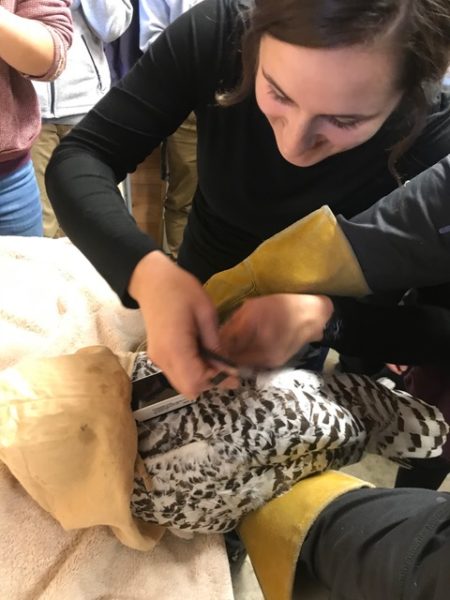
SNOWstorm collaborator and Ph.D. student Rebecca McCabe with Montréal, who still sported green wing markings from her capture last winter at the Montréal-Trudeau airport. (©Rebecca McCabe)
Whenever you work with wild animals, you have to be prepared for your expectations to be upended, and that’s no less true with birds as unpredictable as snowy owls.
After introducing our two new prairie owls in North Dakota yesterday, we were planning to highlight two newly tagged owls that were relocated last week from the Montréal-Trudeau airport in Québec, birds we’d nicknamed Yul and Montréal. They were the latest of many owls we’ve tagged in our ongoing effort to work with airport authorities, federal agencies and private environmental contractors to study the ways in which relocated snowy owls behave, and to help design best practices to moving them so they stay away from runways.

Rebecca McCabe afixes a standard GPS/GSM transmitter to Yul. (©Rebecca McCabe)
Yul — whose odd name comes from the international airport code for the Montréal airport, YUL — worried us from the start, because this third-year female made a beeline from her release site right back to the airport, where she has evaded recapture ever since. Fortunately, though, she was also evading airplanes.
Montréal, on the other hand, steered clear of the airfield, moving north along the Richelieu River, through and past the town of Saint-Jean-sur-Richelieu, just southeast of Montréal. This adult owl came with a history; she had been trapped by FES the previous winter at the Montréal airport, banded by veterinarian and raptor rehabber Dr. Guy Fitzgerald at Union Québécoise de Réhabilitation des Oiseaux de Proie (Québec Union for the Rehabilitation of Birds of Prey), color-marked with green at the bend of her wings so she was recognizable from a distance, and relocated for her safety. This winter, not having learned her lesson, she was retrapped at the airport Nov. 25 by FES, and tagged by Rebecca with one of CTT’s new hybrid GSM/Argos transmitters.
Here’s a short video of Becca releasing Montréal; the owl’s transmitter sports an antenna, which is part of the Argos satellite system:

Rebecca McCabe (far left) and the FES staff with Yul – from left, Cécile de Sérigny, Sarah Gagnon, Alexandre Ducharme, Nicolas Casgrain, Pierre Molina (holding Yul), Marilou G. Skelling and Maxime Allard.
So while we were holding our breath about Yul, we weren’t especially worried about Montréal, even though she had moved back into the middle of Saint-Jean. During the day she often roosted on light poles and road signs along Highway 35 (Autoroute de la Vallée-des-Forts), a four-lane expressway, sometimes moving into residential neighborhoods.

Montréal and Yul both moved north from their release sites along the New York/Vermont borders. Otter (top) just returned from the Arctic. (©Project SNOWstorm and Google Earth)
Unfortunately, yesterday — before we’d even had a chance to the share the news of her tagging widely — Montréal was found dead along a busy highway in Saint-Jean. Dr. Fitzgerald will be performing a necropsy today to determine the cause of death, but we assume she was hit by a vehicle. We don’t yet know if the transmitter was damaged, or can be reused on another owl. (Becca has at least one more unit to deploy on the next appropriate owl, besides Montréal’s.)
We have, over the years, lost a number of snowy owls to cars, planes, electrocution, disease and toxins. It’s never easy, even when, as in this case, the mortality occurs before we have much of a chance to get to know the owl as an individual. But as in the case of those other deaths, as unfortunate as they are, they become a source of important information as we try to understand the threat environment in which these owls live. Montréal’s loss will not be entirely in vain.


8 Comments on “Bonjour, Yul; Au Revoir, Montréal”
Always hate to hear about owls (and any animal) killed by vehicles and other encounters with “civilization.” It’s even harder when we “know” them. I’m sorry about Montreal.
Sorry to hear this. Always hate when a SNOW dies. Of any consequence, we have 2 SNOW down in Wood County, Ohio, just this week.
So very sad to read about Montreal. Snowy owls are truly iconic birds. They (and all birds) face so many hazards. ….
So sorry to hear the news.
Breaks my heart each time we lose an owl.
I was very sad to see the method in which Montreal was released. No bird should be released by throwing it up in the air. I’m sorry, but I work with a local rehabber who despises this practice and says it stresses the bird even more than is necessary. I have to say, from his success at rehabbing birds and having them located at later dates I have to agree with him.
Just curious. How would you know that releasing a bird by throwing it in the air stresses it any more than it’s already stressed?
I am so sorry to hear about Montreal. Thank you for allyou do for these birds. They are magnificent.
You all are doing a wonderful job and I am sorry to hear of this tragic loss. Thank you for all you do!